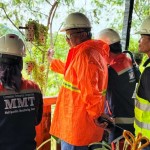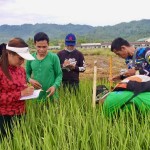Indigenous leaders excited over possibility of mining in their ancestral domain
The tribal council of elders of a Subanen indigenous community in Zamboanga del Norte has overwhelmingly agreed to allow TVI Resource Development Phils., Inc. (TVIRD) to conduct exploration activities in their ancestral domain claim. The consent is contained in the final draft of a Memorandum of Agreement (MOA) that spells out, among others, the terms and conditions for the Company’s proposed exploration project at Tamarok in Jose Dalman town. Ranking officials of the National Commission on Indigenous Peoples (NCIP), the Philippine government agency that oversees the implementation of the Indigenous Peoples Rights Act (IPRA), were on hand to witness the “decision meeting” where the final draft MOA was approved.

“We hope nobody will stop us now,” says Timuay Maximo Tigol (in black long-sleeved shirt), Tamarok Subanen tribal chief, shown here holding a copy of the final draft MOA that he approved with TVIRD in behalf of his tribe. TVIRD is represented by Feliece Yeban (in white shirt), the Company’s Director for Community Relations and Development Office (CReDO). The event was witnessed by NCIP Regional Director Lista Cawanan (in pink, between Tigol and Yeban), as well as by members of the Tamarok Council of Elders, and of the CReDO and NCIP staffs in Zamboanga del Norte.
The decision meeting is part of the free, prior and informed consent (FPIC) process under IPRA which resulted in the drafting of the final MOA, which also contains the benefits the Subanen people will receive when TVIRD’s exploration activities commence in their community. The document will be signed by the Subanen, TVIRD, and the NCIP after the agency has received and reviewed the Company’s FPIC Report and the draft MOA.
The Subanen tribe of Tamarok, headed by Timuay (Subanen title for tribal chief) Maximo Tigol was thankful that, at last, the draft has been completed and that the signing of the MOA can soon be scheduled. “Hinaot pa unta nga wala nay makapakgang sa kalambuan nga ilugway sa taga TVI(RD) ngadto sa Tamarok ilabi kanamo nga mga Subanu, (We hope that now, nobody will stop the development that will be brought by TVIRD to Tamarok, especially to the Subanens),” he said after reading the MOA. It includes provisions requiring TVIRD to come up with an Environmental Work Program in accordance with the rules and regulations of the Mines and Geosciences Bureau; a Social Services, Economic and Community Development Program; and an Educational Assistance Program.
The parties also agreed to include, among others, provisions on Employment, on the Re-Entry of the Subanen to their original landholdings upon the termination of the Companys Mineral Production Sharing Agreement with the Philippine government, as well as the Restoration and Compensation of Affected or Damaged Properties. (A copy of the MOA will be posted in the TVIRD website immediately after the document is signed)

NCIP Director for Region IX Lista Cawanan, extreme left, briefs members of the Tamarok Council of Elders on the details of the Free, Prior and Informed Consent process.
Other Tamarok tribal leaders said that they couldn’t wait for the day of MOA signing. They want it to happen as soon as possible to allow TVIRD to begin its exploration activities in their area. They also expressed hope that the exploration will have positive results so that the Company can proceed will a full-fledged mining operation in Tamarok like the one TVIRD has in Canatuan, an ancestral domain of another Subanen tribe – the Subanon – in Siocon, also in this province.
“Nanghinaot lang usab ako nga kon pananglitan makit-an sa TVI(RD) nga aduna gayod igo-igo nga gidaghanon ang mga menirales sa among dapit aron ilang minahon, daghan pa usab unya nga mga nagkalin-lain nga proyekto alang sa kalambuan ang among madawat. (We hope that if TVIRD finds out the we have enough minerals for them to operate, more projects will come for our development),” Timuay Tigol stressed.
“The MOA and our commitment to follow the FPIC process to the letter manifests our recognition of the Subanen’s inherent and prior rights to their lands and resources,” Felice Yeban, TVIRD Community Relations and Development Office (CReDO) Director, said. “We respect their legitimate authority to require third parties like us to enter into an equal and respectful relationship with them, based on the principle of informed consent.”
Last February, TVI Pacific Inc, TVIRD’s Canadian affiliate, announced that reconnaissance surveys involving semi-detailied geological mapping and sampling over portions of Tamarok and nearby Tapisa tenement applications support previously reported historical findings and have identified additional copper and gold prospective occurrences. TVI Management belives that these early-stage results indicate that both properties have the potential to host copper-gold porphyry deposits.
“In light of the positive results we’re seeing from our preliminary exploration activities, the Company plans to pursue the Tamarok and Tapisa tenement applications on a priority basis,” said Clifford James, President and CEO of TVI Pacific. “While we are encouraged by these developments, the existing results from the exploration program are preliminary and surface results only,” he added. “Follow-up drilling is required to enable us to assess the continuity of the mineralization in all directions – and to enable us to start getting a handle on the potential of these areas.”
Apart from Timuay Tigol and Yeban, the decision meeting was attended by the Tamarok Council of Elders, by NCIP officials headed by Provincial Director Lista Canawan, and by CReDO Manager Jonathan Banez and his staffmembers in Tamarok.
In the Philippines, the IPRA (section 56) requires that FPIC of indigenous peoples is sought and obtained for any activity undertaken in their ancestral lands and territories. The NCIP is mandated by law and responsible for facilitating the process and has issued an administrative order stipulating the process of FPIC. (Raymond Acopiado)



